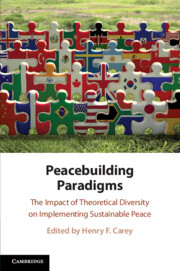Book contents
- Peacebuilding Paradigms
- Peacebuilding Paradigms
- Copyright page
- Contents
- Figures
- Tables
- Contributors
- Foreword
- Introduction Bridging the Conceptual and Theoretical Divides on Peace and Peacebuilding
- Part I The Realist Paradigm
- Part II The Liberal Paradigm
- Part III The Constructivist Paradigm
- Part IV The Cosmopolitan Paradigm
- Part V The Critical Theory Paradigm
- Part VI The Locality Paradigm
- 14 Envisioning PeaceǀTransforming Conflict
- 15 Paradigm Partners for Locally Grounded Peacebuilding
- 16 Cultural Peacebuilding
- Part VII The Policy Paradigm
- Bibliography
- Index
15 - Paradigm Partners for Locally Grounded Peacebuilding
from Part VI - The Locality Paradigm
Published online by Cambridge University Press: 16 December 2020
- Peacebuilding Paradigms
- Peacebuilding Paradigms
- Copyright page
- Contents
- Figures
- Tables
- Contributors
- Foreword
- Introduction Bridging the Conceptual and Theoretical Divides on Peace and Peacebuilding
- Part I The Realist Paradigm
- Part II The Liberal Paradigm
- Part III The Constructivist Paradigm
- Part IV The Cosmopolitan Paradigm
- Part V The Critical Theory Paradigm
- Part VI The Locality Paradigm
- 14 Envisioning PeaceǀTransforming Conflict
- 15 Paradigm Partners for Locally Grounded Peacebuilding
- 16 Cultural Peacebuilding
- Part VII The Policy Paradigm
- Bibliography
- Index
Summary
This chapter is a foray into relationship building among international relations paradigms, peacebuilding practitioner communities, and an analytic toolkit that connects the shared interests and complementary capabilities of these groups. Thistoolkit is highly visual to facilitate communication among these disparate groups. It is based on process tracing, the dominant method for articulating and testing hypotheses of cause-and-effect in a specific situation. In this chapter, Idescribe my approach to local peacebuilding, which is based in the peacebuilding literature that emphasizes a greater need for local agency in the peacebuilding process.This particular literature can be divided into four sections, based on its area of focus: either locally grounded or wider, market based or not. Each area holds promise for peacebuilding success. Iexamine overlapping interests between a locally grounded peacebuilding, with its analytical toolkit, and the various international relations paradigms. I conclude with some thoughts about the a hybrid model as an essential model for peacekeeping and the challenges such an approach faces.
- Type
- Chapter
- Information
- Peacebuilding ParadigmsThe Impact of Theoretical Diversity on Implementing Sustainable Peace, pp. 255 - 270Publisher: Cambridge University PressPrint publication year: 2020



